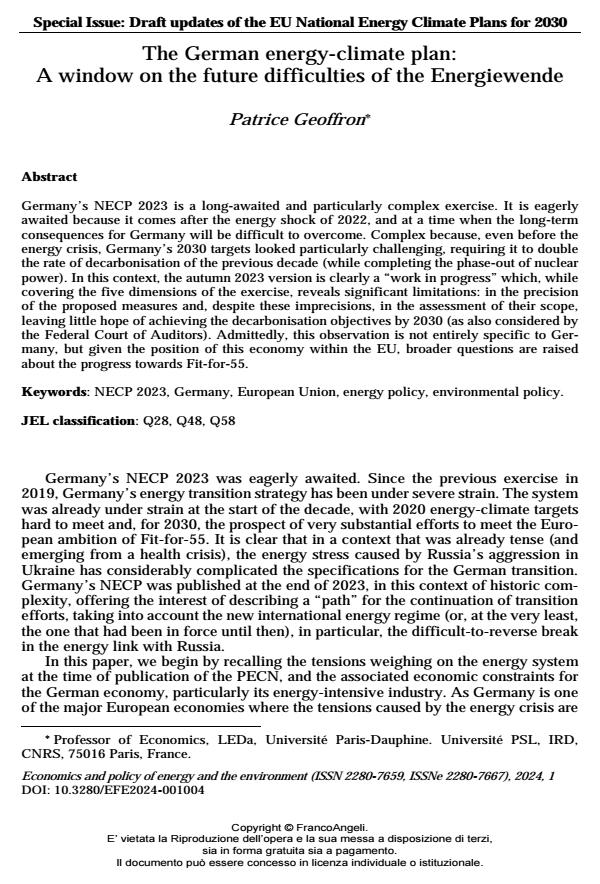The German energy-climate plan: A window on the future difficulties of the Energiewende
Journal title ECONOMICS AND POLICY OF ENERGY AND THE ENVIRONMENT
Author/s Patrice Geoffron
Publishing Year 2024 Issue 2024/1
Language English Pages 12 P. 43-54 File size 153 KB
DOI 10.3280/EFE2024-001004
DOI is like a bar code for intellectual property: to have more infomation
click here
Below, you can see the article first page
If you want to buy this article in PDF format, you can do it, following the instructions to buy download credits

FrancoAngeli is member of Publishers International Linking Association, Inc (PILA), a not-for-profit association which run the CrossRef service enabling links to and from online scholarly content.
Germany’s NECP 2023 is a long-awaited and particularly complex exercise. It is eagerly awaited because it comes after the energy shock of 2022, and at a time when the long-term consequences for Germany will be difficult to overcome. Complex because, even before the energy crisis, Germany’s 2030 targets looked particularly challenging, requiring it to double the rate of decarbonisation of the previous decade (while completing the phase-out of nuclear power). In this context, the autumn 2023 version is clearly a “work in progress” which, while covering the five dimensions of the exercise, reveals significant limitations: in the precision of the proposed measures and, despite these imprecisions, in the assessment of their scope, leaving little hope of achieving the decarbonisation objectives by 2030 (as also considered by the Federal Court of Auditors). Admittedly, this observation is not entirely specific to Ger- many, but given the position of this economy within the EU, broader questions are raised about the progress towards Fit-for-55.
Keywords: NECP 2023, Germany, European Union, energy policy, environmental policy
Jel codes: Q28, Q48, Q58
- Energy renovation challenges in dense low-income neighbourhoods with fragmented ownership: insights from Dortmund–Nordstadt, Germany Stefano Cozzolino, Lisa Haag, in Town Planning Review /2025 pp.1
DOI: 10.3828/tpr.2025.37
Patrice Geoffron, The German energy-climate plan: A window on the future difficulties of the Energiewende in "ECONOMICS AND POLICY OF ENERGY AND THE ENVIRONMENT" 1/2024, pp 43-54, DOI: 10.3280/EFE2024-001004